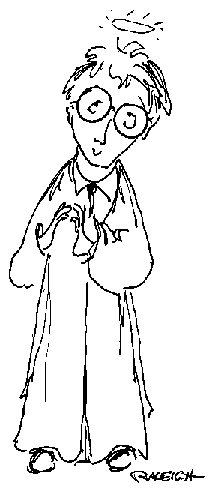 |
Harry Deified
By
HENRY P. RALEIGH
ART TIMES November 2007
I
DON'T KNOW where in the Harry Potter series humans came to be called
Muggles. Isnít there something really condescending about the term?
Muggles, Muggles — would you like to be called a Muggle?
If
it came up in any of the films I must have missed it or muddled it or
muggled it up with a good number of other odd and preciously cute names
of things or people — I was not always sure of the difference
— that are scattered liberally throughout the five extant films.
Keeping a Hedwig and a Hagrid, a Quidditch and a Quaffle and a Quirinus
Quirrel in their proper places isnít easy, you know. And a Malfoy, Crabbe,
and Goyle lumps together in the mind as an old-time vaudeville rather
than a trio of nasty kids.
To
tell the truth, I began to lose my way right after Harry boards the
train for Hogwart in ìHarry Potter and the Sorcererís Stoneî and never
recovered. My problem with Harry, and itís no fault of his or J.K. Rowling,
began when it struck me that Harry bears a strong resemblance to Waldo.
In the early 90ís my last-born child was hooked into the ëWhereís Waldoí
craze. Waldo, if you recall, is, like Harry, slender with unruly dark
hair and large eyes behind prominent round glasses. Both are fond of
long scarves and usually look a bit surprised. True, Harry does not
wear a red and white hat and shirt like Waldo, yet when I see Harry
in the films I see Waldo and if you had ever been forced to sit with
a small tyke searching among an infinity of tiny cartoon figures to
find Waldo — well, it does spoil the magic for you.
Now
Iíve never read any of the seven Harry Potter books although I did take
a crack at The Sorcererís Stone before seeing the film. The cover
illustrations for the books, so clearly aimed at younger minds, was
discouraging but that was before I became aware of the claims that the
Potter series is one of the great literary achievements of the century,
a work that is prophetic, moralizing, inspirational, and touched the
divine. Yes sir, by the divine. Thatís hard to beat and bound to rub
off on the film adaptations. This shows you how smart filmmakers were
to pick up on this back in 2001 and how fast things move nowadays. A
great literary classic used to hang around gathering dust for decades
before a studio dug it up to belt out an ëartí film to make up for all
the trash it was accustomed to making. Look how long the BrontÎs had
to wait before racking up some much needed box office returns.
And
what about Jane Austen? The Old Testament moldered away for centuries
before Cecil B. DeMille stumbled upon it and did a pretty fair job of
pepping up this ancient material in ìThe Ten Commandmentsî — did
it twice, as a matter of fact. All those old classic authors certainly
missed out on the big bucks expiring as they did before any film rights
offers came along. How they must be envying J.K. Rowling whose wealth
is second only to, or exceeds, depending on who is adding it up, the
Queen of Englandís. Harryís a goldmine, all right.
Already
the divinity, or morality, or literary beauty of the Harry Potter books
has blessed the domestic and overseas gross of not only the most recent
Harry Potter film but its predecessors in re-runs, as well. ìHarry Potter
and the Order of the Phoenixî set a new record high and will probably
keep right on giving until 2008 when the next and sixth film, ìHarry
Potter and the Half-Blood Princeî comes due. The seventh film, ìHarry
Potter and the Deathly Hallowsî, is planned for summer 2010 and not
a second too soon, Daniel Radcliffe is getting long in the tooth.
There
is speculation about exactly how this last film will end. Oh sure, Harry
will do in Voldemort, but the book has an epilogue — nineteen
years later. Harry is married to Ginny Weasley and has three kids, Ron
Weasely also, surprisingly, married to Hermione Granger and with two
children. Now I ask you, would anyone have the appetite to see this
unfolding in the final film — marriages, teen-age problems, using
magic to have the best lawns in their suburban neighborhood? I donít
think so.
